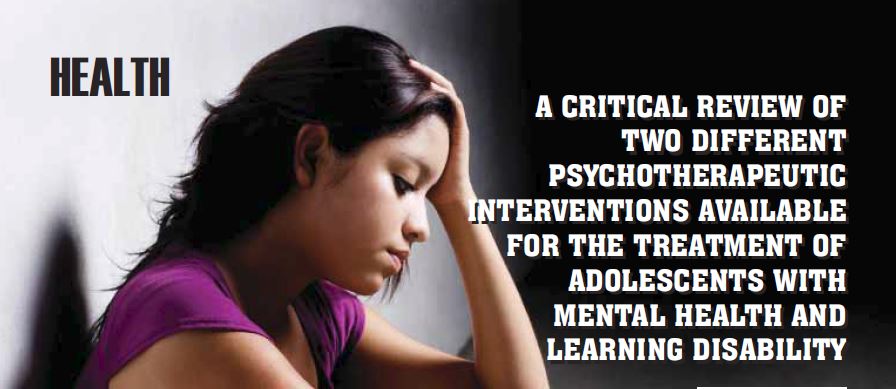
Psychotherapeutic methods can be useful in the management of learning disabilities and treatment of functional mental illness. Interventions are limited due to difficulties with psychological-mindedness, impulsive acting on feelings, fantasies and limited introspectiveness. Subjecting these therapies to further scientific trails would produce useful evidence of efficacy and effectiveness. This review critically evaluates Dialectical Behavioural Therapy and Counselling in terms of advantages, disadvantages and treatment efficacy.
It has been suggested that disorders and diseases are man made concepts with myriad underlying assumptions which change over time (Campbell EJ et al 1979). The healthy skepticism of what disorder actually represents is further compounded by the concepts underlying therapeutic interventions.
The Oxford English Dictionary, 2nd edition defined therapy as “treatment intended to relieve or heal a physical disorder or illness; the treatment of emotional problems using psychological methods”. The word therapy originated from the Greek word ‘therapeia’ meaning healing. Furthermore therapeutic was defined as “relating to the healing of disease; having a good effect on the body or mind”. Treatment was defined as “medical (Physician) care for an illness or injury” and care as looking after and providing for needs”.
The above concepts (disorder and therapeutic interventions) have led to classification, labelling, stigmatization and discrimination with opportunities to bring benefit and harm.
Dialectical Behavioral Therapy
Dialectical Behavioral Therapy (DBT) is a complex integrative therapy developed by Marsha Linehan (1991). It draws on ideas from behavioral, cognitive therapy, psychodynamic therapy and also incorporates elements from Eastern philosophy and meditation techniques.
Linehan argued that the main problem with patients experiencing borderline personality disorder was emotional dysregulation. The treatment aspirations of dialectical behavioral therapy include reduction in behaviours which cause harm, reduction in behaviours which interfere with therapy and reduction in behaviours which diminish quality of life and personal relationships. The therapy involves individual and group therapy formats which last for a minimum of 12 months.
There are three stages of therapy. Stage 1 focuses on suicide and deliberate self harm prevention with recording of episodes, exploration of internal and external antecedents. In Stage 2 the patient is helped with the emotional processing of previous traumatic experiences .In Stage 3 the aim is to help the individual to develop self esteem and to help them work towards realistic future goals.
Dialectical Behavioural Therapy is widely implemented in NHS and Independent healthcare sector services. This followed published qualitative study exploring those clients with therapeutic experiences of DBT (Araminta 2000). Further evidence of its efficacy was highlighted by Hamed et al in 2006. It must be emphasised that there is a substantial body of evidence and opinion demonstrating that the outcomes of various other psychotherapies with clinical populations are equivalent (Marzillier 2004).
Patient’s engagement, vary from curiosity to complete disbelief and motivations to seek change are considered to be of value. (Clarke et al 2004).
Dialectical behavioral therapy is a highly structured and manualised treatment, which calls for a high level of commitment from clients. Although valued by some, others would have liked a more bespoke approach. This then raises the interesting question regarding the extent to which any psychotherapy approach needs to include a capacity for flexibility and modification to respond to the uniqueness of individuals, that is, individual treatment linked to case formulation as opposed to diagnosis driven. On the other hand it is interesting to realize that the principle of a highly structured treatment is required to enable change for clients who are disorganized and difficult to engage.
The issue of pluralism in psychotherapy provision was raised by the Layard hypothesis. The Layard hypothesis was first expressed in a Cabinet Office paper titled Mental Health Britain’s biggest social problem. In this paper Layard argues that on both logical and economic grounds, it makes sense to improve access to psychological therapies. But in this context, therapy meant evidence based treatments identified in NICE National Institute of Clinical Excellence Guidelines which, in effect, is a single model brief cognitive behavioral therapy
Counselling
Counselling could broadly be considered as a method of relieving distress undertaken by means of a dialogue between two people. The aim is to help the client find their own solutions to problems, while being supported to do so and being guided by appropriate advice.
Counselling skills are very useful in mental health services. Counselling and psychotherapy have overlapped in their methods and skills. Counselling services are myriad in the voluntary and private sectors, some directed towards specific problems and some are more general. Thus “Counsellors” could be defined in various ways.
The recent United Kingdom Government directives with the Department of Health and the National Institute for Health and Clinical Excellence guidelines explicitly recommended particular therapeutic orientations for particular forms of psychological distress (Department of Health 2001). It highlighted that counselling does produce change. However, it was also noted that no single therapeutic counselling approach had the superior grasp of the truth (Wampold, 2001).
Research has shown that counsellor ways of working matches that of the client predictions, engagement is better, alliance rating tends to be increased and there is some evidence that outcomes are directly improved (Addis and Jacobson 2000). There is also evidence to suggest that when clients have an opportunity to talk about what happens in therapy and its aims prior to its commencement, attendance rates and outcomes tend to be improved (Van Audenhove and Vertommen 2000).
In the current healthcare market place which is highly competitive, more emphasis and value has been placed on therapists who prefer logic, order and clear operational sequences to therapy with the therapies being quantitative and subject to scientific research. On the other hand the humanistic approaches which have fundamental basis in the mysteries, complexities and existential dimension of human experience have suffered. The inability of the treatment outcome to be measured and observed to stand up to rigorous scientific research such as randomized controlled trials was a major factor.
Furthermore, the therapies that treat psycho aetiology and therefore psycho diagnosis are preferred in that the therapists are assumed to think intelligently, critically and creatively in order to develop specific treatment plans. Some authorities believe that counselling is cheap and that the long and difficult process of giving disturbed people control over their minds is not being thoroughly addressed. (Portter 2007)
Counselling in particular has on occasions been described as simplistic, quick fix producing superficial results. It has also been accused as overlooking gender and power differences and neglecting the differences (Dermer et al 1998).
Conclusion
In conclusion, it is very exciting to see that there is a myriad of therapies available with regard to treatment of adolescents with learning difficulties and mental health issues. While there is still a great deal of work that needs to be done in scientifically testing the various therapies, thinking intelligently, critically and creatively, the wheels are in motion and this can only benefit the specified populations we most wish to help. WAM
Dr. Ihenacho Igbokwe is a Clinical Director and Consultant Psychiatrist working at St Luke’s Hospital, Ellingham Road, Attleborough, NR17 1AE. Correspondence to Dr I. Igbokwe Acho@mild-pc.co.uk Competing interests: None Declared
References
- Addis ME and Jobson NS (2000) A closer look at the treatment rationale and homework compliance in cognitive behavioural therapy for depression. Cognitive Therapy and Research 24, 313-326.
- Araminta T (2000) Dialectical behavioural therapy: A qualitative study of therapist and client experience. Dissertation abstracts international: Section B: The Sciences and Engineering, 61,520
- Campbell EJ, Scadding JG, Roberts RS (1979) The concept of disease. British Medical Journal 29, 757-62.
- Clarke H, Rees A and Hardy G (2004) The big idea: Client’s perspective of change processes in cognitive therapy. Psychology and Psychotherapy: Theory Research and Practice, 77, 67-89.
- Department of Health. Treatment choice in psychological therapies and counselling. Evidence-based clinical practice guidelines. London. Department of Health, 2001.
- Dermer SB, Hemesath CW, Russell CS (1998) American Journal of Family Therapy 26(3) 239-50.
- Hamed M, Banavan S, Lynch TR (2006) Dialectical behavioural therapy: An emotion based treatment for BPD. Journal of Contemporary psychotherapy 36, 67-75.
- Linehan MM, Armstrong HE, Suarez A, Allmon D, Heard HL (1991) Cognitive behavioural treatment of chronically parasuicidal borderline patients. Archives of General Psychiatry 48: 1060-1064.
- Marzillier J (2004) The myth of evidence based psychotherapy. The Psychologist 17, 392-395.
- Oxford English Dictionary 2nd Edition pages 788-789.
- Potter V (2007) Market forces: opportunity or threat? Healthcare counselling and Psychotherapy Journal 7(2); 2-5.
- Van Audenhove C and Vertommen H (2000) A negotiation approach to intake and treatment choice. Journal of Psychotherapy Integration, 10, 287-299.
- Wampold B (2001) The Great Psychotherapy Debate: Models, Methods and Findings. Mahwah NJ: Erlbaum.

















